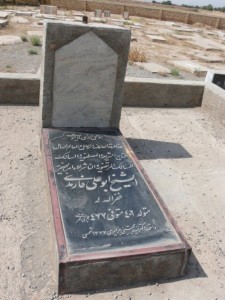| Quick Navigation |
Silsilah
-
1. Muhammed Rasuul Allah e
-
2. Hazrat Abu Bakr as-Siddiq t
-
3. Hazrat Salman al-Farsi t
-
4. Hazrat Qassim h
-
5. Hazrat Jaafar Saddiq h
-
6. Hazrat Abu ba-Yazid Bostami h
-
7. Hazrat Abul Hassan Kharqani h
-
8. Hazrat Abu Ali Farmadi h
-
9. Hazrat Yusuf Hamadani h
-
10. Hazrat Abdul Khaliq Ghujdawani h
-
11. Hazrat Arif Reogri h
-
12. Hazrat Mahmood Anjir Faghnawi h
-
13. Hazrat Azizan Ali Ramitani h
-
14. Hazrat Muhammed Baba Samasi h
-
15. Hazrat Syed Ameer Kulal h
-
16. Hazrat Syed Bahauddin Naqshband h
-
17. Hazrat Ala'uddin Attaar h
-
18. Hazrat Yaqub Charkhi h
-
19. Hazrat Ubaydullah Ahraar h
-
20. Hazrat Muhammed Zahid Wali h
-
21. Hazrat Darwaish Muhammed h
-
22. Hazrat Khwajgii Amkingi h
-
23. Hazrat Raz'uddin Baqi bi-l-Lah h
-
24. Hazrat Ahmed Sarhindi Faruqi h
-
25. Hazrat Muhammed Masum h
-
26. Hazrat Saifuddin h
-
27. Hzrt Syed Nur Muhammed Badawani h
-
28. Hazrat Mirza Jan-i Janaa Mazhar h
-
29. Hazrat Shah Ghulam Ali h
-
30. Hazrat Shah Abu Saeed h
-
31. Hazrat Shah Ahmed Saeed h
-
32. Hazrat Shah Muhammed Umar h
-
33. Hazrat Shah Abul Khair Dehlvi h
-
34. Hazrat Bilal Faruqi h
-
34. Hazrat Zaid Abul Hassan Faruqi h
-
34. Hazrat Salim al-Faruqi h
-
34. Hazrat Shah Abdul Aziz Kuhlnavi h
-
35. Hzrat Syed Mahmood Hassan Rizvi h
-
35. Hazrat Khwaja Masoom h
-
35. Hazrat Abdul Rahim h
-
36. Hazrat Nisar Ahmed h
8. Hazrat Abu Ali Farmadi h
|
[ to be translated in English ] |
جلوت وخلوت مری گہواۂ وحدت بنے |
| [ to be translated in English ] | بوعلی حق کے ولی حق آشنا کے واستے |
- Extracts from Sijra-ay-Tayyiba - Shiekh Syed Mahmood Hassan Rizvi (Rehmat'ullah Alaiyh)
حضرت سیدمیاں محمّد حسن محمود رضوی نقشبدی مجددی عزیزی رحمتاالله علیه
Translation to English by Anwar-un-Nabi [please forgive any mistakes]
- Details
- Written by Anwar-un-Nabi (انوارالنبی ابن نسار احمد)
He was son-in-law of Shaykh Abul-Qāsim Gurgānī quddisa sirruhū (d. 450 AH) and his chief spiritual successor. Shaykh Gurgānī received spiritual secrets from Shaykh Usmān Maghribī, who received from Shaykh Abū-Alī Kātib, who received from Shaykh Abū-Alī Rūdbārī, who received from Imām Junaid al-Baghdādī, and this chain goes to Sayyidinā Imām Alī, radiy-Allāhu anhum ajma’īn.
- Details
- Written by Anwar-un-Nabi (انوارالنبی ابن نسار احمد)
Abu `Ali al-Farmadhi at-Tusi
May Allah Sanctify His Soul"O child! said Luqman the Wise,
Do not let the rooster be more watchful than you,
calling Allah at dawn while you are sleeping."
He is right, he who said:
"The turtle-dove wept on her branch in the night
And I slept on--what lying, false love is mine?
If I were a true lover, never would turtle-doves overtake me.
I am the dry-eyed lover of his Lord, while animals weep!"Ghazali, Ayyuha-l-walad.
He is called the Knower of the Merciful and the Custodian of Divine Love. He was a scholar of the Shafi'i school of jurisprudence and a unique `arif (endowed with spiritual knowledge). He was deeply involved in both the School of the Salaf (scholars of the First and Second Centuries) and that of the Khalaf (later scholars), but he made his mark in the Science of Tasawwuf. From it he extracted some of the heavenly knowledge which is mentioned in Qur'an in reference to al-Khidr ![]() : "and We have taught him from our Heavenly Knowledge" [18:65].
: "and We have taught him from our Heavenly Knowledge" [18:65].
